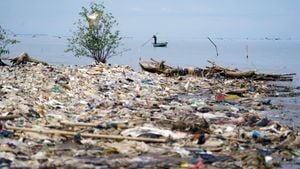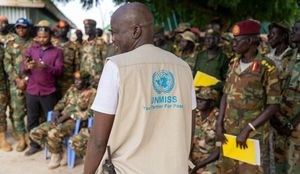Hurricane Helene has left quite the mark on the Southeastern United States, particularly affecting residents from North Carolina to Georgia through its relentless winds and unforgiving rains. Residents of small towns like Red Hill and towns throughout southern Georgia are grappling with not just the chaos during the storm but the painful aftermath. People are finding their homes damaged, lives uprooted, and, more critically, communication lines severed, which exacerbates the already overwhelming situation.
When Hurricane Helene made landfall, its power was felt far beyond just the immediate geographical area. High winds and torrential rains destroyed homes and buildings, uprooted trees, and knocked out power to countless families. The emergency response has become tricky, especially when you think of the insatiable demand for information during crises like this. Residents across the region struggled to communicate after the hurricane; many lost cell service completely, leaving them disconnected from loved ones, and even emergency systems.
“No one knew if we were dead or alive,” Kacie Smith, who runs Red Hill's general store, shared, illustrating the struggle with the nearest communication being Wi-Fi hotspots scattered throughout the debris. This lack of contact not only provoked fears for personal safety but also hampered the ability to relay important logistical information, like where to find gas or generators.
While cell phone companies have emergency systems at the ready, including mobile towers and satellite services, the physical access to restore services is hampered by significant infrastructural damage caused by the storm. Jonathan Sury from Columbia University's National Center for Disaster Preparedness noted, “There’s this extreme dependency on communication we didn't have years ago.” This speaks volumes about how much society has evolved—people almost expect quick restoration of utilities after paying for them.
The situation has been dire; over 200 fatalities have been reported due to the storm. Some residents still don't have cell service or access to important communication resources as the restoration of power continues to plummet due to the sheer magnitude of Helene's path of destruction. The urgency was so acute, the federal government dispatched 40 Starlink terminals to provide some measure of connectivity for those affected by the storm.
Verizon has deployed several mobile communication trucks called T.H.O.R., the Tactical Humanitarian Operations Response vehicle. These mobile systems contain satellite antennas and temporary towers to restore service. Unfortunately, they couldn’t reach the hard-hit areas until roads became passable. With thousands still without power, Verizon has over 1,000 workers and contractors helping clear routes and restore connectivity.
But, the pain doesn't end there. For residents, recovery isn't just about restoring communication or power. Helene's wrath has exposed pre-existing weaknesses within the system—not just structures but also communities. The low-income backdrop intensifies the issues faced: as recovery processes delay, people are more susceptible to poverty risks, food scarcity, and lack of proper housing. The greatest tragedy is seen among older residents like Joellen Cooper, whose home was torn apart by Helene just after recovering from Hurricanes Idalia and Debby.
Facing frequent storms, many elderly residents are trapped by circumstances—like Cooper and her 16-year-old cat suffering amid harsh conditions, struggling against unmanageable repairs. Despite having lived through rough patches before, she finds herself facing serious challenges now. After years of not needing insurance and living paycheck to paycheck, the thought of home repairs, financial stability, or seeking assistance seems insurmountable.
Equity issues combine with systemic failures to create layers of preventable suffering. The recurrent hurricanes compound existing infrastructural problems. The struggles of residents like Cooper and her neighbors illuminate the broader systemic flaws—an inability to handle such increasingly frequent weather-related disasters. Valdosta’s poverty rate is alarming, pushing the already strained community to its absolute limits.
When storms hit, it’s not just about the repair bill but about missing work, the costs of healthcare, and the demands of family. Sadly, many of those suffering—like Vicki Lawrence, who bravely manages to scrape by on minimal funds—are left overlooked, bearing the brunt of disasters quietly without the needed support.
Efforts to mobilize assistance are underway, and as electric companies and disaster response organizations like CORE work hard to facilitate recovery, the residents simultaneously forge their own paths to resilience. They band together, cook meals, and distribute supplies, showcasing the indomitable spirit of community. It’s not easy, and many tasks are undertaken under overwhelming strain, but as Lawrence shared, “We’re just trying to get through.”
But municipal governments face multiple challenges as they struggle to meet growing expectations for recovery services. This reality shows how intertwined the roots of poverty and infrastructure failures are. Addressing these won't be quick or easy, and many fear they may remain overlooked long after shallow recovery efforts fade from the headlines.
Valdosta’s recovery is progressing, but it’s lurching, with countless voices echoing doubts about the sustainability of recovery programs amid persistent storm occurrences. The community, familiar with hardships, works tough and tenacious, but without significant investment and support, they fear this calamity will become the norm. The hurricane may have subsided, but the real challenge begins now for affected individuals as the road to recovery stretches on.



